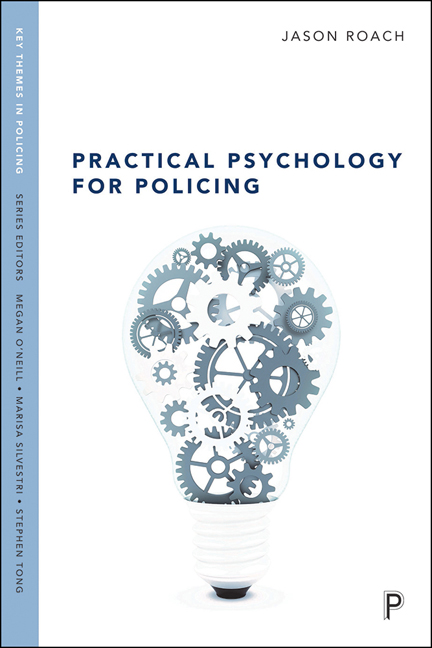Book contents
- Frontmatter
- Dedication
- Contents
- Series preface
- List of figures, tables, and boxes
- Acknowledgements
- 1 Introduction (or unleashing the kraken)
- 2 Psychology and policing: welcome bedfellows?
- 3 Human and police decision-making
- 4 Challenging common police perceptions of career criminals and serious offenders
- 5 Self-Selection Policing
- 6 Psychology, expertise, and improving police officer street-craft
- 7 Psychology and crime prevention
- 8 Psychology and police wellbeing
- 9 Psychology and policing: taking stock and where do we go from here?
- Notes
- References
- Index
6 - Psychology, expertise, and improving police officer street-craft
Published online by Cambridge University Press: 17 January 2024
- Frontmatter
- Dedication
- Contents
- Series preface
- List of figures, tables, and boxes
- Acknowledgements
- 1 Introduction (or unleashing the kraken)
- 2 Psychology and policing: welcome bedfellows?
- 3 Human and police decision-making
- 4 Challenging common police perceptions of career criminals and serious offenders
- 5 Self-Selection Policing
- 6 Psychology, expertise, and improving police officer street-craft
- 7 Psychology and crime prevention
- 8 Psychology and police wellbeing
- 9 Psychology and policing: taking stock and where do we go from here?
- Notes
- References
- Index
Summary
Introduction
In the Introduction to this book, it was stated that one of its primary aims was to help improve the transfer of ‘tacit knowledge’ (the knowing ‘how to’ do something and not just ‘what to’ do) between those working in policing, particularly from one generation of officer (or staff) to another. Indeed, I have already suggested that the guides and training available to new and inexperienced police officers overwhelmingly provide know-how on processes and procedures; for example, the ‘Core Investigative Doctrine’ (ACPO/Centrex, 2005), which, although providing valuable guidance on the basic processes and procedures of criminal investigation, says little about how to make good decisions and how to do things well, in the way that learned experience and a good mentor can (but not always) provide.
In this chapter, the concern for tacit knowledge transfer between police officers (and staff) is addressed to some degree, with a little added psychological understanding and knowledge, to suggest how frontline, routine, ‘beat’ policing, or what is affectionately referred to by many police officers ‘longer in the tooth’, as officer ‘street-craft’, can be improved, and the tacit knowledge hole plugged. More specifically, how the core duties of policing; that is, those high on the list of original ‘Peelian principles’,1 including the ‘number one’ to prevent crime (and others such as patrolling and dealing with the public) can be improved. By way of an example of how psychological research and police practice can work together, research is presented that mixes some basic knowledge of the psychology of lying and deceit with a common policing situation – that of asking individuals stopped by police their current address, before then moving to explore how psychology can explain some of the gems of tacit knowledge, referred to by some as ‘police street-craft’, that I have been lucky enough to pick up from 15 years of speaking with, working with, and observing police officers in action.
We begin the chapter with a brief exploration of what ‘expertise’ is and what it means to be ‘an expert’ and ask whether there is any specific psychology that lies behind (or underneath) them, which can be spread wider to all those involved in policing.
- Type
- Chapter
- Information
- Practical Psychology for Policing , pp. 66 - 77Publisher: Bristol University PressPrint publication year: 2023

